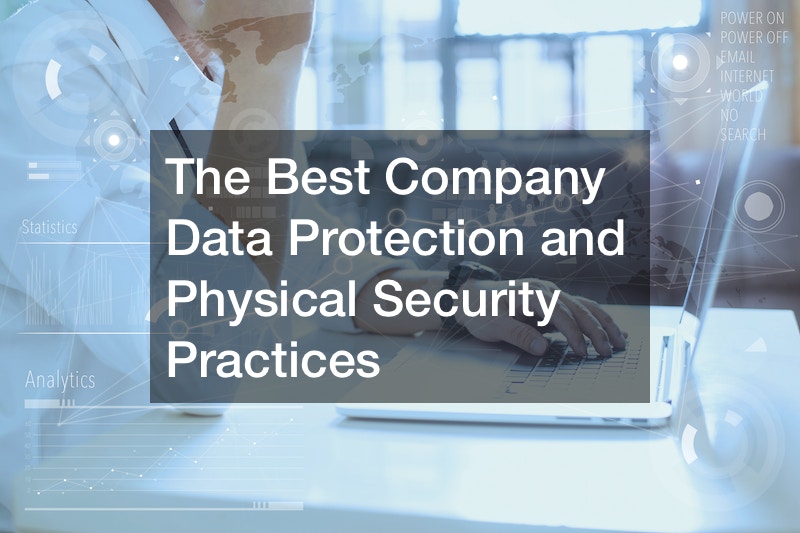The Best Company Data Protection and Physical Security Practices

As a business owner today, you face all sorts of security risks daily. From your data to the physical structure, there’ll always be someone or something trying to gain unauthorized access and bring you down. That’s why you should take it upon yourself to ensure the best company data protection and physical security practices. Here’s a guide to help you.
1. Enhance Your Data Security with Smart Building Technology

How businesses approach security has completely changed with the introduction of smart building technology. What we previously mostly saw in sci-fi movies is now possible. You have many options for innovative security measures at your disposal, including intrusion detection, access control, and video surveillance systems for reliable company data protection.
Intrusion detection systems identify unauthorized entry or movement in restricted areas, so you’ll always know when someone is where they’re not supposed to be. This way, you can take the appropriate action promptly. Access control systems manage access and track employee movements using electronic locks and key cards, allowing you to prevent unauthorized access even when you’re not on site. Video surveillance systems will allow you to monitor your business premises in real-time so you can act on any suspicious activity before it develops. You can also invest in environmental monitoring systems that detect hazards such as smoke, fire, and gas leaks so you don’t get caught off-guard.
When choosing and deploying these solutions, consider your company’s unique security requirements, budget, scalability needs, and ease of use. You may wonder, ”How can I do this? I’m just a business owner.” Well, you can work with a qualified security systems integrator for this part. A reliable one will also train your staff on the importance and how to use these systems.
2. Craft a Robust Physical Cybersecurity Strategy
Proper company data protection goes beyond safeguarding your physical systems and assets from unauthorized access, use, disclosure, disruption, modification, or destruction. It extends past computer equipment and networks to encompass buildings, facilities, and inventory. Physical cybersecurity measures deter criminals from targeting physical assets, protect against sabotage, and mitigate the impact of potential acts of terrorism.
It typically involves conducting risk assessments to identify potential threats and implementing appropriate security controls, such as security cameras, access control systems, motion sensors, intruder alarms, innovative alerting technology like AI analytics, and perimeter security. For this to be effective, work with a reliable expert who can advise on what best suits your company. They, too, help with employee awareness of incident response procedures and feature installation.
3. Install Modern Security Systems

While data protection and physical security are essential, the costs involved can be a barrier. Purchasing and installing modern security features such as sensors is expensive. Small business owners often face financial barriers when they want to invest, sometimes giving up the practices.
If that’s why you have hesitated to spend on competent company data protection, there’s a solution. You can quickly secure your small business without breaking the bank. How? Small business loans. These give you access to funds that you can use for security equipment, security policy implementation, employee training, and security audits.
To select a reliable small business loan service, consider interest rates, fees, loan terms, and the lender’s reputation. Craft a clear plan for using the funds to demonstrate your financial stability, and seek pre-approval before shopping for security solutions. Talk to entrepreneurs with a business model like yours to identify the measures that worked for them. This way, you won’t end up in debt for a system that doesn’t even suit your line of business.
4. Maximize Security with the Experts
As a business owner, the vast array of data protection and physical security options probably leave you with more answers than questions. You may need to enlist expert help to make informed choices. This leaves you with the risk of selecting an unsuitable company for data protection services, which can be bad for business. Sometimes, you may ditch getting one for not knowing which security services best suit your company.
That’s where a business broker comes in. These professionals connect you with the right security solutions for competent company data protection. Their extensive industry network allows them to identify suitable providers as soon as they understand your needs, offering you the best value. You can rely on them to analyze your operations and identify gaps, then recommend the most suitable security system to close them.
Remember that pricing is always flexible. Don’t be too quick to accept the first price quote you get. At the end of the day, your aim as a business owner is to make a profit, so ensure you get the most favorable terms. For example, you can request lower monthly fees.
5. Integrate Alarm Systems for Comprehensive Physical Security

Alarm systems protect your company by deterring, detecting, and responding to security incidents. However, the market is flooded with many options, and choosing the right one isn’t as easy as it may initially seem. Luckily, some alarm system businesses offer guidance in this journey. They can help you craft and implement a tailored alarm system solution to meet your unique security requirements. They also provide ongoing monitoring and support to ensure your system’s proper functioning.
Company data protection is a serious aspect of business that you don’t just hand over to the first service provider that comes knocking. Doing so would be as reckless as failing to install a security system. Rushed decisions may also have you paying for a system that doesn’t match your security and protection needs. How, then, do you know you’ve found your match?
When selecting an alarm system business to service your company, consider their experience, expertise, reputation, and cost. Do they have a history of helping companies like yours protect their data and assets? Can they design and implement customized alarm system solutions? What do their references and online reviews say? What are their monthly monitoring fees?
6. Understand The Available Security And Protections Options
Data protection and physical security systems come in many varieties, such as access control, video surveillance, intrusion detection, fire alarms, and data encryption. Access control systems restrict entry to authorized personnel. Video surveillance records footage to monitor activity and deter crime, while intrusion detection uses sensors to signal unauthorized access. Fire alarms detect smoke and fire, generating alarms and notifying emergency responders, and data encryption secures sensitive information.
Used correctly, these systems will benefit your business in countless ways, including safeguarding data and assets from theft, loss, and damage. Additionally, they act as crime deterrents, improve compliance with industry regulations and data protection laws, and provide a competitive advantage by showcasing a commitment to security. Check the size of your business and how it’s structured before settling for a system. This way, you can tell if alarm systems will offer you quality company data protection or if you should go for motion sensors instead.
Selecting and installing these systems requires time and expertise as they’re complex. To get it right, consider your business’s size, the budget at hand, and desired features, like remote monitoring, access control, and video surveillance. Working with a dependable installer is crucial at all stages, as purchasing the wrong system would be a loss.
7. Access Data Protection While on the Move

Is your company located in a remote area, and you have challenges safeguarding equipment, tools, vehicles, hazardous materials, sensitive data, documents, and personnel? Consider investing in a job site security trailer. These often feature high-definition cameras, motion sensors, and alarm systems. The most advanced ones have additional security elements like solar panels, backup batteries, and two-way radios.
These trailers detect theft and vandalism, send timely alerts to your security personnel, and collect video evidence for criminal identification, helping to ensure company data protection. To ensure you get a security trailer that best serves your needs, consider your business’ size and determine the features you need most.
For this, you’ll need to partner with a reputable supplier. They’ll help you choose a viable location, anchor the trailer to prevent theft, and position cameras for comprehensive coverage. You can also hire them for regular maintenance to ensure your security trailer functions at maximum capacity.
8. Choose the Right Storefront Glass
Your storefront is the first thing potential customers see when they approach your building. It’s largely responsible for the initial impression they’ll have of your business, and you won’t have a second chance at creating one. However, while you want to use it to create the most welcoming facade, it’s important to note that it can also provide easy access for ill-meaning individuals. Luckily, certain storefront glass types offer some level of security levels. You need to know their differences so you select the right one.
Annealed glass is the most common; it is cost-effective and easy to install but shatters into sharp shards if broken. Tempered glass is more robust and shatters into blunt pieces but is more expensive. Laminated glass is the most secure option, comprising multiple glass layers bonded with plastic. It’s also the most costly. Polycarbonate, a durable plastic, is impact and scratch-resistant, making it ideal if your business is located in a high-risk area.
All these options require different installation methods, so you want to leave the job to the pros. Don’t DIY, as poor installation will result in premature wear and tear and easier break-ins. It could also pose cut risks to your employees and customers. So, if there’s one thing you should do, it’s to collaborate with a storefront glass expert. Besides helping you select the quality ones for your business, they’ll ensure proper installation and offer maintenance tips and services.
9. Optimize Physical Security with Unbreakable Doors
Glass exterior doors are a popular choice for businesses today owing to their modern and inviting appeal. However, security should be at the top of your priority list when selecting these doors. The standard glass allows easy break-ins. Luckily, there are different ways through which you can reinforce these doors for better impact resistance.
Metal bars and grates deter break-ins but compromise the aesthetic appeal and visibility of your doors. If you want guaranteed company data protection, try security glazing. This is constructed by binding multiple layers of glass together, making it highly resistant to impacts and forced entry.
To bolster the security of your commercial glass doors, prioritize working with professionals with a solid reputation in security glazing. Gather testimonies from companies like yours and assess online reviews to make an educated choice. Always go for professional installation of your commercial glass doors to ensure they are correctly secured and compliant with safety standards. Commit to routine maintenance like glass cleaning and hardware inspections for signs of wear and tear, as poor maintenance leads to security breaches.
10. Hire Competent Locksmith Services
As you work to protect your business against security risks, one of the best things you can do is enlist the help of locksmith companies. These professionals can help you in several ways. For example, if thieves recently compromised your main door, it’s understandable that you may be concerned about the safety of your inventory and valuables.
Your business’s working documents hold sensitive information that you don’t want to get in the wrong hands. So, if someone tried to break into your business premises, it only makes sense that you should change your locks. A professional locksmith can help reinforce your access methods, which will contribute to your company data protection efforts..
Safeguarding your business’s data and physical resources is essential, regardless of your company’s size or industry. Through the above practices, you can protect your company from a wide range of potential threats. For maximum company data protection, conduct routine security assessments, enforce strong access controls with passwords and multi-factor authentication, encrypt sensitive data, back up data regularly, and educate employees on cybersecurity best practices.
Since security is an ongoing process, hire a professional service provider to periodically review your security measures and adjust them as per emerging safety and security trends. However, be careful and intentional about who you bring on board. Don’t make the mistake of hiring just anyone who claims to be a professional; there are some really bad people out there. Do your due diligence. The last thing you want is to hire someone to help make your business more secure, only for them to be the threat you never see coming.



